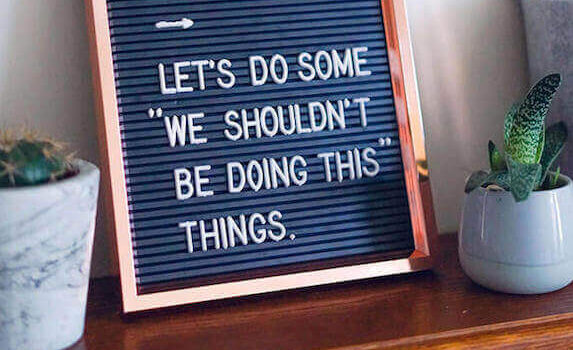
We all know the nagging inner critic that bombards us with a constant stream of “shoulds.” You should have worked harder. By this point, you should be further along in your career. You should eat healthier and exercise more. While often well-intentioned, these self-imposed directives can become overwhelming and harmful to our mental health. In this article, we’ll explore what should statements are, how they may impact us, and effective strategies to quiet that critical inner voice.
What Are Should Statements?
Should statements are cognitive distortions that manifest as rigid, inflexible beliefs about how things “should” or “ought to” be. They impose unrealistic standards, leading to feelings of guilt, inadequacy, and frustration when these expectations aren’t met. These statements often originate from societal norms, familial expectations, or personal ideals. There are four major types of should statements:
Self-Directed Shoulds: These are expectations we place on ourselves. For instance, “I should exercise more regularly,” or “I should always be productive.”
Other-Directed Shoulds: These involve expectations we place on others, such as “My partner should anticipate my needs without me asking,” or “My kids should always listen and behave perfectly.”
World-Directed Shoulds: These are beliefs about how the world or situations should be. For example, “The traffic shouldn’t be this bad,” or “The weather should be nicer today.”
Hidden Shoulds: These are implicit expectations that are not immediately obvious but still influence our thoughts and behaviors. They are often revealed in our reactions to certain situations. For example, feeling resentful when others don’t thank you for your efforts might indicate a hidden should: People should always recognize and appreciate what you do.
The Effects of Should Statements on Mental Health
Should statements can contribute to a range of emotional and psychological challenges. Here’s how they can affect us:
Chronic Stress: Feeling that you should always be perfect, productive, or pleasing others, can create a constant state of high alert, draining your energy and resilience over time.
Depression: When the gap between your perceived reality and your should statements widens, it can result in feelings of hopelessness and despair. Believing that you should be happier, more successful, or more capable, but feeling unable to achieve these standards, can shift you further into depressive thoughts and behaviors.
Increased Anxiety: Constantly feeling that you should be doing something different or better can create a perpetual state of worry and tension. This relentless pressure can lead to chronic anxiety, as you continuously feel you’re falling short of expectations.
Obsessive-Compulsive Behaviors: In some cases, the belief that you should control every aspect of your environment or that things should always be perfect can lead to compulsive actions and rituals. These behaviors often develop as a way to cope with the anxiety produced by such thoughts.
Low Self-Esteem: When you repeatedly tell yourself that you should be different or better, it reinforces a sense of inadequacy and self-doubt. This negative self-talk can undermine your confidence and self-worth.
Eating Disorders: Should statements related to body image and diet can contribute to eating disorders. For instance, believing that you should adhere to a certain body type or strict dietary rules can lead to unhealthy eating behaviors.
Reframing Should Statements
As you can see, should statements can negatively impact your well-being, making it crucial to reframe them. Here’s how to effectively do that:
1. Identify and Challenge: The first step is to recognize when should statements arise. Pay attention to your self-talk and note whenever you catch yourself thinking in terms of “should.” Once identified, question their validity. Ask yourself, “Why do I believe this? Is this based on realistic and achievable expectations?”
2. Be Flexible: Instead of using rigid should statements, switch to softer, more flexible language. For example, replace “I should finish this task perfectly” with “I would prefer to do my best, but it’s okay if it’s not perfect.” This approach reduces pressure and acknowledges that it’s acceptable to have imperfections.
3. Focus on Values: Shift your mindset from rigid rules to core values and intentions. Align your actions with what truly matters to you rather than arbitrary standards defined by others. For instance, instead of “I should always help others,” think “I value kindness and will help others when I can.”
4. Set SMART Goals: Evaluate whether your expectations are achievable by setting Specific, Measurable, Actionable, Realistic, and Timely (SMART) Goals. For example, instead of “I should always be productive,” try “I will do my best to balance productivity and self-care by scheduling focused work sessions and breaks, tracking progress daily for a month.”
5. Practice Self-Compassion: Embrace self-compassion by treating yourself with the same kindness and understanding that you would offer a loved one. When things don’t go as planned, remind yourself that everyone makes mistakes and it’s okay not to meet every expectation.
6. Acknowledge Achievements: Regularly recognize and celebrate your accomplishments, no matter how small. This practice helps counterbalance the negativity of should statements and builds a positive self-view. Replace “I should have done more today” with “I did my best today, and I’m proud of what I achieved.”
By implementing these strategies, you can gradually transform the rigidity of should statements into more compassionate and realistic ways of thinking. This shift alleviates the pressure and guilt associated with should statements. It also promotes a healthier, more balanced approach to life.